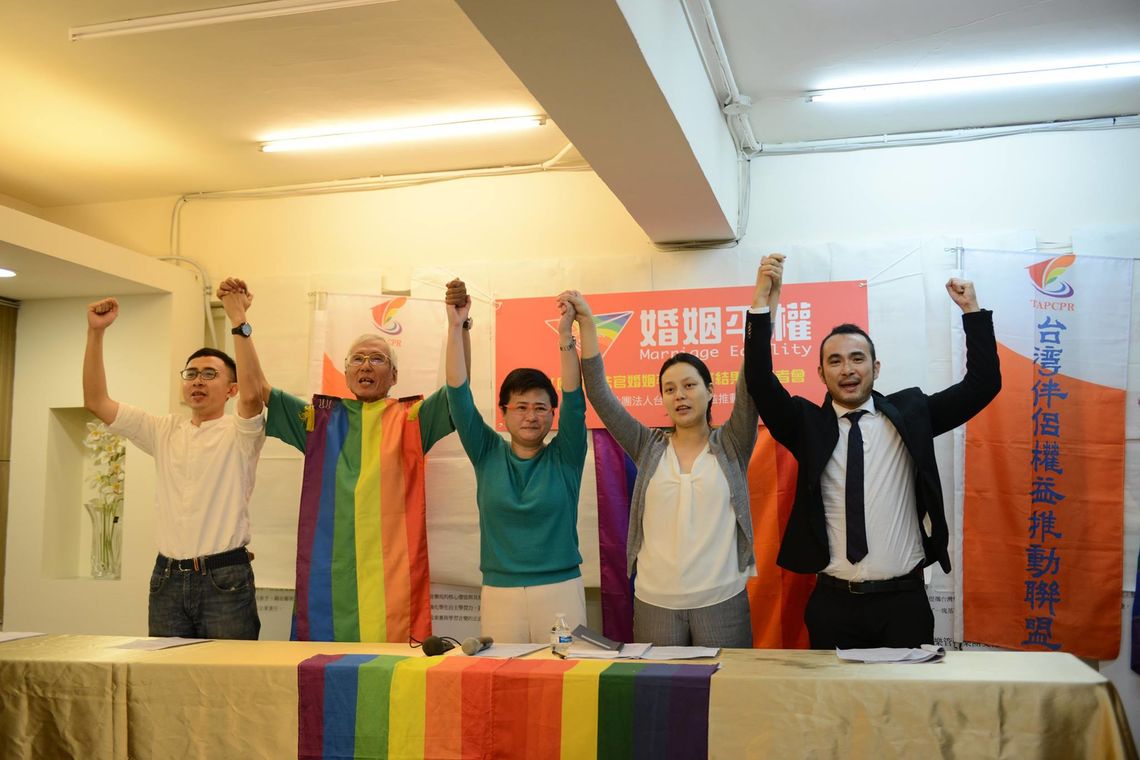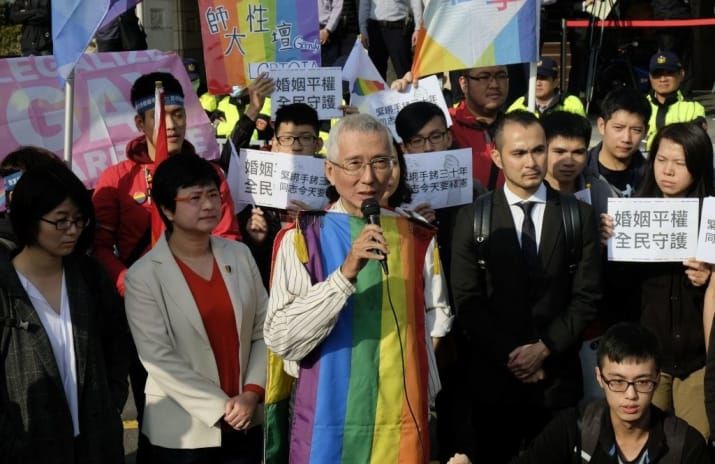Same-Sex Marriage Is Not A Western Idea, Says Lead Lawyer In Historic Taiwan Ruling
by Lane Sainty (BuzzFeed News Reporter, Australia)
"It was not easy, but after all, we won."
The lead lawyer in Taiwan's historic marriage equality court decision says same-sex marriage is not the sole domain of Western nations and that the ruling is a "good start" for other Asian countries.
The Constitutional Court ruling, handed down Wednesday, said the part of the Taiwanese Civil Code banning two people of the same sex from marrying violates the freedom of marriage and the right to equality guaranteed in the constitution.
The court made its decision after considering two different suits, one brought by longtime gay activist Chi Chia-wei and the other by the Taipei City government.
Victoria Hsu, lead counsel for Chi Chia-wei and the CEO of the Taiwan Alliance to Promote Civil Partnership Rights, told BuzzFeed News people were "crying, just crying" after the decision was handed down.
"We have waited for so long," she said. "It's not just one day, or two years. For Mr Chi Chia-wei, it's over three decades. He advocated for the same-sex marriage rights since 1986.
"It was not easy, but after all, we won."
News of the ruling spread around the globe, partially due to its regional significance: Taiwan will likely become the first place in Asia to legalise same-sex marriage.
"This would be a good start for other Asian countries," Hsu said. "Everyone is looking at the development in Taiwan. Of course, every country has their own social context and their battles to win."
Hsu said she believed the ruling showed "there is no so-called Asian value" that prevents the region from accepting same-sex marriage.
"Some people think same-sex marriage is a Western thing, but I don't think so," she said. "Mr Chi Chia-wei [has] demanded the government recognise same-sex marriage since 1986. Holland, as the first country to legalise gay marriage, was not until 2001. Obviously this is not something from Western culture."
In a press statement issued after the ruling, the court outlined several reasons for its decision – in some cases, going beyond legal argument to offer a broader reflection on how same-sex marriage will affect society.
Same-sex marriage will not affect heterosexual marriages nor "alter the social order", and should not be denied just because same-sex couples cannot naturally procreate, the judges wrote.
"Furthermore, the freedom of marriage for two persons of the same sex, once legally recognized, will constitute the collective basis, together with opposite-sex marriage, for a stable society. The need, capability, willingness and longing, in both physical and psychological senses, for creating such permanent unions of intimate and exclusive nature are equally essential to homosexuals and heterosexuals, given the importance of the freedom of marriage to the sound development of personality and safeguarding of human dignity."
Hsu said the judges' statement addressed concerns made public by marriage equality opponents in the lead up to the court hearing.
"For a long time, in the past and even until now, some opponents insisted that if we allow same-sex couples to get married, then that would destroy our traditional family values [and] have that influence to the children," she said.
"I think [the judges] wanted to show that they believe the LGBT citizens are just like the heterosexual citizens in our society. We should enjoy the same rights, and be treated as normal persons."
Hsu added, with a laugh: "It means we are not especially dangerous, or have some kind of magic power to destroy this world."
Taiwan's president Tsai Ing-wen, who is a supporter of same-sex marriage, offered on Facebook a relatively neutral response to the ruling.
"Dear fellow people of Taiwan, the ruling is not a win or a lose," she wrote. "No matter what your stance is on the issue of same-sex marriage, this is a moment to look at all those around us as our own brothers and sisters."
To Hsu, the president's "milder statement" indicated an effort to find a middle ground between a euphoric LGBT community and angry marriage equality opponents.
"The anti-gay groups, they were frustrated yesterday," Hsu said. "She's trying to be neutral. It's obvious that the LGBT community won. And she's trying to balance that."
The ruling, while hugely significant, did not automatically legalise same-sex marriage. Rather, the court ordered the parliament to amend the law in keeping with the ruling within two years. If the parliament fails to do so, the ruling will still come into effect.
President Tsai said the government would take the ruling into account and submit a legal proposal "as soon as possible" for the parliament to review.
A bill for same-sex marriage passed a first reading in the parliament in December 2016, and a second and third reading may occur later this year.
For Hsu, who is a trailblazer in her own right as a prominent, out lesbian lawyer in Taiwan, the victory is not solely professional. When the law is changed, she, like so many others, plans to marry.
"Yeah, I have a fiancee. I call her my wife. She calls me her wife too," she said.
"I have to explain that to some straight citizens. They are wondering who is husband and who is wife. And we say, 'We are both the wife'."
發佈日期: 2017/05/25



轉
推
+1
寄